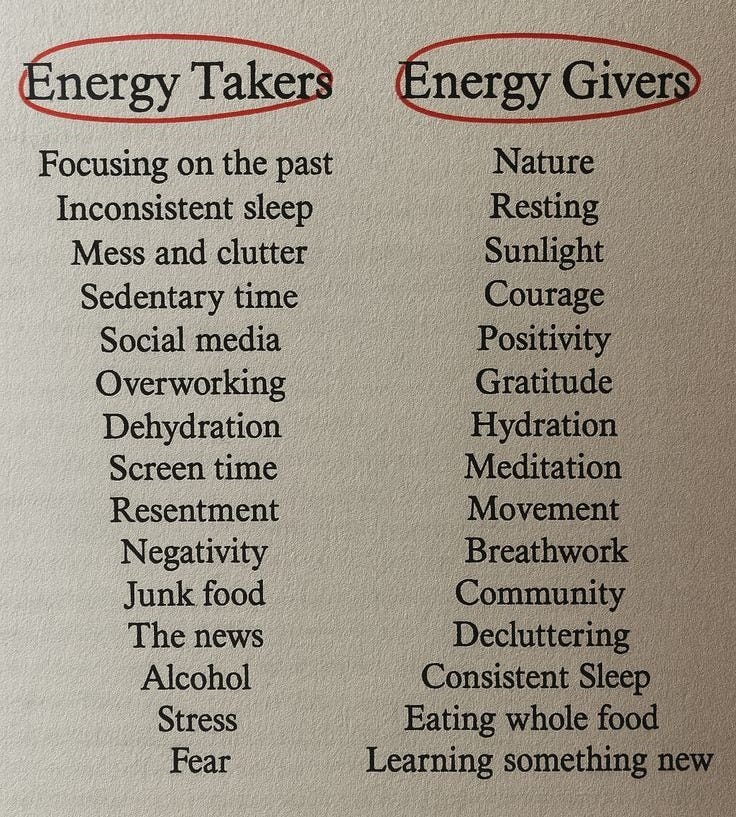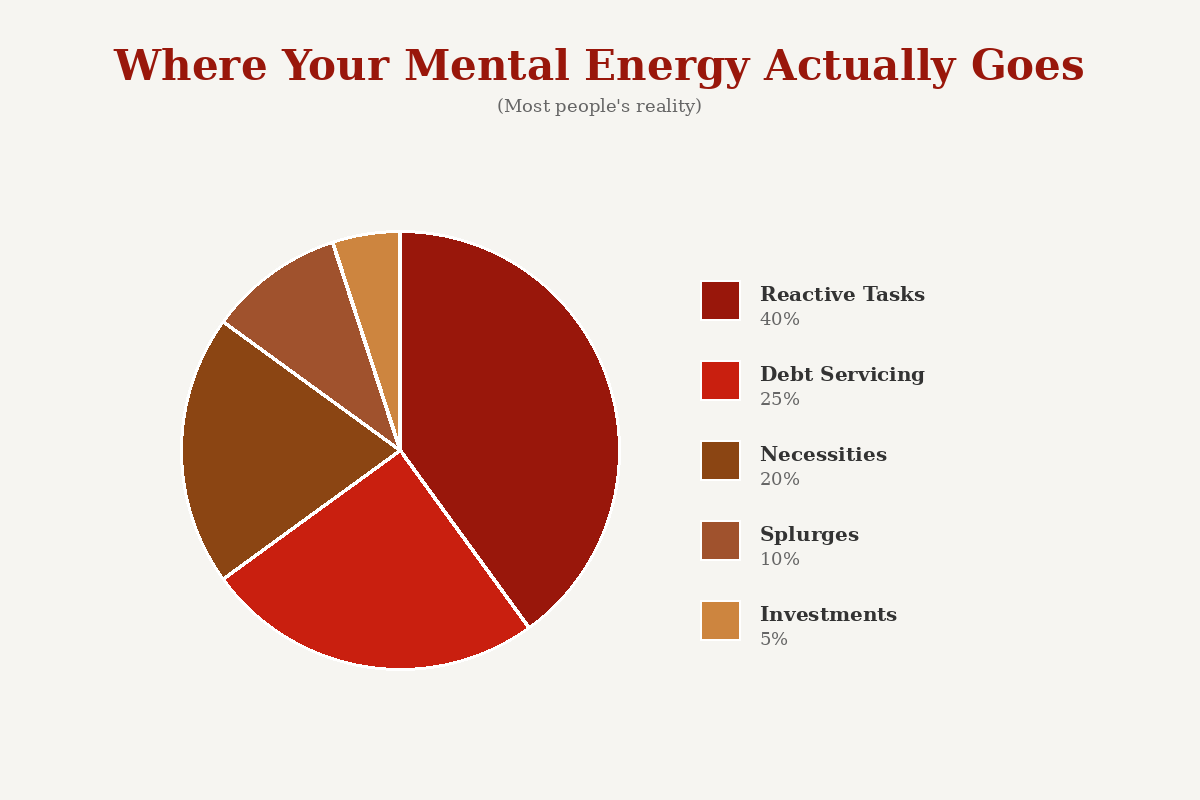Why you're mentally broke and how to become mentally rich instead
THE GUIDE TO: mental budgeting
This is the third installment in a series of guides I’m building for people who want to think more clearly, and live more consciously and creatively. The first one covered self-sovereignty and how to reclaim your agency in a culture that profits from your confusion. The second offered models for mental self-defense, and ways to stay grounded when everything around you is optimized for manipulation. This one builds on both by introducing a practical framework for treating your cognitive resources like the finite asset they actually are.
Your mental energy works exactly like money: you have a finite amount, most people are overspending on garbage they don’t need, and very few are tracking where it actually goes. This guide is about learning to allocate your attention deliberately instead of letting it leak out in a thousand small transactions you’ll never remember making.
If you find value in this kind of thinking, I hope you’ll consider subscribing. Paying readers get access to every guide in the series, all twelve weeks of THE DAILY 5 journaling framework (Q2 starts January 1st!), my full archive of essays, ongoing bite-sized art histories featuring my favorite creative muses, and more.
Trying something new: each week I’m temporarily unlocking one post from the paid archive. This week’s post is “The price of attempting difficult things.” You have 7 days to read it before it locks again. x
THE GUIDE TO: mental budgeting
Mental budgeting is not productivity theater. I’m not going to tell you to wake up at 5am or optimize your morning routine into some frictionless machine. What I am going to do is show you how to recognize that your attention, cognition, and emotional bandwidth operate like currency, and right now most of us are living well beyond our means.
What’s inside this guide:
01: What is mental budgeting?
A working definition of attention as currency, thoughts as transactions, and why your brain is not a bottomless well.
02: Why most people are mentally broke.
Too many tabs open, no awareness of what their attention is funding, and the poverty loop that keeps you overdrawn.
03: Inputs vs outputs (and hidden taxes)
The invisible cumulative costs of doomscrolling, notification culture, ambient anxiety, relational ambiguity, open loops, and carrying other people’s chaos in your head, plus what actually restores your bandwidth.
See also: a framework for conscious consumption
04: Core models for budgeting the mind.
Locus of Control, Inversion, First Principles, Energy Mapping, and Feedback Loops as foundational tools.
See also: the thinking person’s toolkit: 50 concepts that rewire how you see the world
05: Audit and categorize your mental spending.
Breaking down your day into Necessities, Investments, Splurges, and Debt Servicing.
06: Setting your mental budget.
A practical template for allocating bandwidth across deep focus, strategic rest, social energy, and other inputs.
07: Practices and prompts for the budgeter’s mind.
Daily rituals and reflection questions to keep your mental budget aligned with reality.
08: Mental budgeting in practice.
Case studies on creator burnouts, relationship bandwidth, and the ROI of beauty and awe.
09: Budgeting metaphors I like.
Reframing busyness, scarcity thinking, and what mental luxury actually means.
By the end of this guide, you’ll have a working framework for reclaiming your cognitive bandwidth and using it deliberately. You’ll know how to identify what’s actually draining you (versus what just feels busy), how to protect the conditions required for deep work and creative output, and how to stop funding the inputs that degrade your capacity to think clearly. You’ll understand why you’re exhausted even on days when you didn’t accomplish anything meaningful, and more importantly, you’ll know how to fix it. This is about building sovereignty over your own attention in a world designed to fracture it, maintaining the emotional stability that comes from operating within your actual capacity, and making better decisions because you’re not constantly overdrawn. Mental budgeting gives you back the space to think strategically, create meaningfully, and stay connected to who you actually are instead of who the noise is subconsciously shaping you into.
01: What is mental budgeting?
Mental budgeting is the practice of allocating attention, cognition, and emotional energy with intention. If you think of your bandwidth as currency and your thoughts as transactions, it becomes clear that your brain is not a bottomless well. It’s a strategic account with limited reserves, and every time you refresh the news, spiral into rumination, or leave a conversation unfinished in your head, you’re making a withdrawal.
Some of those withdrawals are necessary, but most are not, and very few people are tracking which is which.
This guide is about becoming conscious of where your cognitive resources are actually going and deciding, in advance, what deserves funding. It’s not about restriction or discipline for its own sake but about sovereignty, because your mind is one of the only spaces left where you still have control, and you should be treating it accordingly. Most people don’t realize they’re mentally bankrupt until they hit a wall in the form of burnout, brain fog, or decision fatigue so thick they can’t even pick what to eat for dinner. It’s not a personal failing so much as just what happens when you spend without tracking, invest without returns, and let your attention get pulled in every direction until there’s nothing left for what actually matters.
Simone Weil wrote that attention is the rarest and purest form of generosity. Mental budgeting flips that question around to ask what would happen if you treated your cognitive resources the way you treat your rent money. What if you stopped defaulting to yes on every demand, distraction, or open loop that floats across your field of view, and what if you actually accounted for the cost of every input before letting it in? This is not about becoming some cold, hyper-optimized machine but about staying intact, about having enough clarity left at the end of the day to think your own thoughts, make your own choices, and not just collapse into passive consumption because your brain is too fried to do anything else.
The framework is simple in that you track where your bandwidth goes, categorize what it’s funding, and reallocate based on what actually compounds. That’s it, and there’s no app required, no complicated system, just a little honest accounting.









